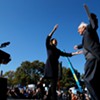Published March 31, 2010 at 6:02 a.m.
Vrooommmmm!!!
Ssshhhhhhhhh???
Some residents within earshot of Burlington International Airport are fighting to block the arrival of a new generation of military jets that could be much louder than the F-16 warplanes that currently rattle their windows.
A few of the same activists are also lobbying for noise restrictions on early-morning and late-night commercial flights.
Airport officials warn that opposition to the new F-35s could endanger the mission of the Vermont Air National Guard (VTANG) and the jobs and services that come with it. The simultaneous effort to limit the flying times of commercial aircraft would have “unbelievably bad economic ramifications” for the entire state, adds Brad Worthen, the airport’s community liaison officer.
The intensifying conflict between the airport and some of its neighbors highlights an underlying political issue that could pit Burlington against South Burlington. Although the airport, known in aviation circles as BTV, lies within South Burlington’s borders, it is owned by Burlington, which appoints four of the five members of the citizens commission that oversees BTV’s operations. South Burlington City Councilor Meaghan Emery regards that as an unfair distribution of power and has sought an increase in the suburban community’s representation. Burlington likes the commission’s composition just the way it is. And South Burlington City Council Chairman Mark Boucher appears reluctant to initiate action that could jeopardize what he describes as a generally cooperative relationship with the airport.
Burlington’s control of the airport has also exposed it to criticism over the destruction of scores of moderately priced homes within a house-elimination zone that snakes along BTV’s western boundary. South Burlington has gone along with this house-razing program, which pays fair-market value for the properties and does not force homeowners to sell. But Chittenden County’s shortage of affordable housing makes it difficult for those who do sell to find comparably convenient places to live.
Because average daily decibel levels inside the strip exceed permissible limits, the Federal Aviation Administration has funded the bulldozing of 83 homes in the past 12 years. Another 55 homeowners within the zone have expressed their eagerness to sell to the FAA. That will leave 30 houses still in the way of what may one day become an airport access road and commercial district with offices and hotels.
Hosting the F-35 in Burlington could necessitate expanding the size of the home-removal zone, according to opponents of the plan; they claim the F-35 may be three times noisier than the F-16. Potential enlargement of that area would constitute “a huge issue,” Boucher acknowledges. But, like most of his colleagues, Boucher wants to let the preparatory process play out before taking a stand on the F-35s. He points to an April 19 South Burlington City Council meeting at which a U.S. Air Force representative will map the steps ahead.
BTV is one of five airports around the country under consideration as a site for about two dozen of the F-35s, which cost $112 million apiece to manufacture. The decision on where to base the stealth fighters is scheduled for less than a year from now, although actual deployment probably would not occur until a year or so after that. Crucial to the choice is an Air Force study of the F-35s impact on the Burlington airport’s vicinity; those findings may be published by August.
Councilor Emery is already saying the F-35s don’t belong at BTV. She and a contingent of local Internet activists reject the Air Force’s contention that exact decibel outputs of the supersonic fighter aren’t yet known. “A prototype has been flying since 2000, so the Air Force damn well knows how loud the thing is,” says Linus Leavens, who has lived near the airport since 1957.
Local opponents point to studies that found F-35s flying from Eglin Air Force Base in Florida to be considerably louder than F-16s. These and similar reports are being used to promote a petition urging the South Burlington City Council to go on record against basing F-35s at BTV.
Juliet Buck, an anti-F-35 blogger in South Burlington, suggests that safety could be as much of a concern as noise. “This is product testing,” Buck, the mother of two Central School students, says of F-35 shakeout flights. “I don’t feel comfortable about that in this area.” Linus Leavens recalls a 1965 jet trainer crash that killed two Vermont Air National Guard officers in a field three miles from the Burlington Airport.
Worthen, BTV’s liaison to South Burlington, argues that the Vermont Air National Guard base may be targeted for closing unless it is chosen to host the F-35. “It could be crucial to having the Green Mountain Boys continue their mission,” Worthen says. “Many air bases around the country are on a closure list, and the F-16 is going to be retired one day.”
VTANG charges the airport nothing for crash-and-rescue services that would otherwise cost $2 million a year, Worthen notes. He further cites the 400 jobs linked to VTANG. Vermont’s congressional delegation also views the basing decision as potentially vital to VTANG.
Worthen is just as perturbed by a second petition circulating in South Burlington neighborhoods that urges the city council to enact an ordinance setting special fees for commercial aircraft taking off or landing between 11 p.m. and 7 a.m. “According to FAA guidelines,” the petition states, “the noise produced by one nighttime operation is perceived to be as loud as 10 operations.” George Maille, an organizer of this drive, says he hopes to garner 400 signatures, which “ought to be enough to get the city council’s attention.”
According to Emery, South Burlington would be obligated to put the noise issue on its ballot if 5 percent of the city’s registered voters sign the petition. That would amount to about 600 signatures, she estimates.
An ordinance discouraging late-night and early-morning commercial flights would be “a disaster” for BTV and for Vermont’s economy, which receives a $350 million annual boost from the airport, Worthen says. Noting that many passengers use BTV to connect to flights at other airports, Worthen says about 40 percent of Burlington’s departures take place before 7:30 a.m. He says talk of a noise ordinance could potentially dissuade an airline from expanding its BTV flight schedule.
Maille, who has lived within 100 yards of the airport for the past 33 years, says his family and neighbors on Logwood Street “are already experiencing a disaster” due to noise from operations at an airport that has steadily expanded. Maille lives just outside the house-elimination zone.
To Gene Richards, chairman of the Burlington airport commission, the attempt to restrict nighttime flights is “the work of some people who want to have their homes bought out.” Richards says he would like to ask them, “What were you thinking when you bought that house?” He likens moving across the street from BTV to buying next to a UVM dorm.
Richards describes himself as “100 percent receptive” to having F-35s at Burlington International. “I hear the noise the F-16 makes,” the Burlington resident adds. “I think it’s exciting. I think it’s part of being in a lively community. If you want quiet all the time, you should move to Montgomery.”
More By This Author
Speaking of...
-

A Franklin County Nonprofit Is Drawing Young Women Into Aviation Careers
Feb 21, 2024 -

Weinberger Picks Longo for Burlington Aviation Director
Sep 14, 2022 -

Loaded With Cash and Poised to Expand, Beta Technologies Sees Clear Skies Ahead
Apr 26, 2022 -

Skier, Pilot and Shooting Survivor Manon Belzile Is the 'Motor Ninja' at Beta Technologies
Oct 20, 2021 -

WTF: Who’s Been Flying Aerial Stunts Over Southern Chittenden County?
Aug 4, 2021 - More »
Comments
Comments are closed.
From 2014-2020, Seven Days allowed readers to comment on all stories posted on our website. While we've appreciated the suggestions and insights, right now Seven Days is prioritizing our core mission — producing high-quality, responsible local journalism — over moderating online debates between readers.
To criticize, correct or praise our reporting, please send us a letter to the editor or send us a tip. We’ll check it out and report the results.
Online comments may return when we have better tech tools for managing them. Thanks for reading.















































